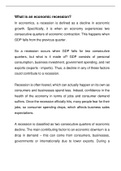What is an economic recession?
In economics, a recession is defined as a decline in economic
growth. Specifically, it is when an economy experiences two
consecutive quarters of economic contraction. This happens when
GDP falls from the previous quarter.
So a recession occurs when GDP falls for two consecutive
quarters, but what is it made of? GDP consists of personal
consumption, business investment, government spending, and net
exports (exports - imports). Thus, a decline in any of these factors
could contribute to a recession.
Recession is often feared, which can actually happen on its own as
consumers and businesses spend less. Indeed, confidence in the
health of the economy in terms of jobs and consumer demand
suffers. Once the recession officially hits, many people fear for their
jobs, so consumer spending drops, which affects business sales
expectations.
A recession is classified as two consecutive quarters of economic
decline. The main contributing factor to an economic downturn is a
drop in demand – this can come from consumers, businesses,
governments or internationally due to lower exports. During a
, recession, people lose their jobs, businesses go bankrupt, the
stock market falls, and the exchange rate tends to fall.
Causes of recession
Economic output, or GDP, is made up of consumer spending,
business investment, government spending, and net exports.
Therefore, a recession will occur when one of these factors
declines significantly, outpacing the growth of the other
components. For example, a sharp decline in consumer spending
could be offset by growth in government spending, resulting in a
net effect on GDP that would be zero. A recession can result from
a decline in one component, two components, or all four
components of GDP. However, what are the factors that will cause
this and cause the recession?
1. Business/consumer trust
Business confidence could fall due to government policy, lower
consumer spending or rising interest rates, among other things.
This decline in confidence has an impact on investment (a
component of GDP) as businesses fear it will generate decent
returns. At the same time, consumer confidence is waning, likely
stemming from rising unemployment, weak economic growth and




